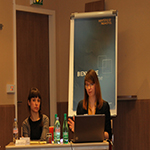Euroacademia Conferences
 Europe Inside-Out: Europe and Europeanness Exposed to Plural Observers (9th Edition) April 24 - 25, 2020
Europe Inside-Out: Europe and Europeanness Exposed to Plural Observers (9th Edition) April 24 - 25, 2020 Identities and Identifications: Politicized Uses of Collective Identities (9th Edition) June 12 - 13, 2020
Identities and Identifications: Politicized Uses of Collective Identities (9th Edition) June 12 - 13, 2020 8th Forum of Critical Studies: Asking Big Questions Again January 24 - 25, 2020
8th Forum of Critical Studies: Asking Big Questions Again January 24 - 25, 2020 Re-Inventing Eastern Europe (7th Edition) December 13 - 14, 2019
Re-Inventing Eastern Europe (7th Edition) December 13 - 14, 2019 The European Union and the Politicization of Europe (8th Edition) October 25 - 26, 2019
The European Union and the Politicization of Europe (8th Edition) October 25 - 26, 2019 Identities and Identifications: Politicized Uses of Collective Identities (8th Edition) June 28 - 29, 2019
Identities and Identifications: Politicized Uses of Collective Identities (8th Edition) June 28 - 29, 2019 The European Union and the Politicization of Europe (7th Edition) January 25 - 26, 2019
The European Union and the Politicization of Europe (7th Edition) January 25 - 26, 2019 7th Forum of Critical Studies: Asking Big Questions Again November 23 - 24, 2018
7th Forum of Critical Studies: Asking Big Questions Again November 23 - 24, 2018 Europe Inside-Out: Europe and Europeanness Exposed to Plural Observers (8th Edition) September 28 - 30, 2018
Europe Inside-Out: Europe and Europeanness Exposed to Plural Observers (8th Edition) September 28 - 30, 2018 Identities and Identifications: Politicized Uses of Collective Identities (7th Edition) June 14 - 15, 2018
Identities and Identifications: Politicized Uses of Collective Identities (7th Edition) June 14 - 15, 2018
Euroscepticism Amongst Youth in Serbia and Croatia As An Extreme Form of Strategic Coalition
-
-

-
Presentation speakers
- Astrea Pejović and Jovana Papović, Faculty of Politics, University of Belgrade, Serbia
- Download presentation
Abstract:
After the disintegration of the Socialist Federative Republic Of Yugoslavia, newly formed nation-states constructed their nationalistic ideologies in reflection to the Western World. While Serbian national identity was formed in an opposition to the western discourse, Croatia based its nationalism on the continuity within its independent presence in Europe. Today, twenty years after the separation, both countries went through transitional processes, mostly generating its legitimacy through EU integration. Nevertheless, at the moment when both Serbia and Croatia are almost inside the EU, researches show that the majority of young people believe that joining the European Union would only worsen the economic situation in their country (44% in Croatia and 48% in Serbia). Post-socialist reforms were (politically) mainly justified by the consensus around the European future while the EU institutions were the major forces that have legitimized these reforms. Although generally very optimistic towards EU integration, Euroscepticism emerged in both Serbia and Croatia especially inside youth groups. The main reason for this sceptical feeling is in majority produced by both the prolongation of the transitional situation and the European paternalistic relation to the Balkans. On one hand, right-wing nationalists apprehend the re-birth of Yugoslav multiculturalism that could potentially abolish national feeling, while, on the other hand, anti-liberal leftists deny processes of European integration calling the negative effects of liberal capitalism in their argumentation. To illustrate these mechanisms, we can take the examples of the anti-NATO demonstrations in Belgrade in 2011, the “Facebook demonstrations” that took place in Zagreb at the same year or the recurrent student protests against liberalization of the university system in all ex-Yugoslavian countries. Both anti-liberal and nationalistic scepticism are united in a strategic coalition. This paper rethinks the politics of difference as an activist strategy and examines the forms of Euroscepticism currently existing in the ex-Yugoslavian countries amongst youth.
-
Related Presentations

Images and Chimeras: The Role of Images in the European Society and in Iconographic Traditions
- Victor Anches

How cosmopolitan is European Identity?
- Alexander Kustov

The Role of External Perceptions in the European Identity Formation
- Irina Khayrizamanova















